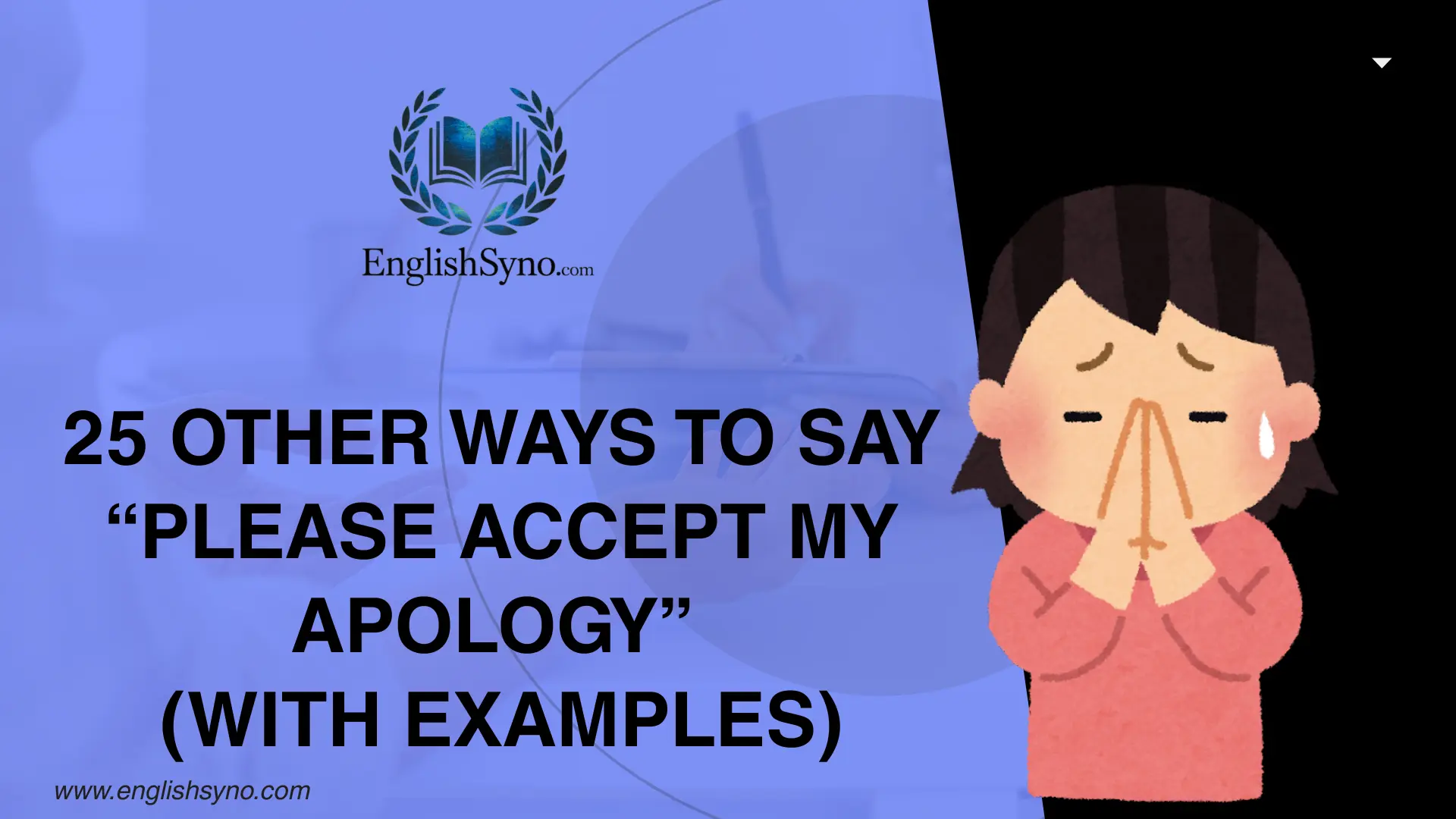When you want someone to please accept my apology, it’s vital to choose your words with care, as a polite, formal way to express regret for a mistake or wrongdoing can make a big difference in maintaining relationships and trust.
This article lists ten alternatives suitable for different professional scenarios, using phrases that are considered respectful and effective. Saying the right words clearly shows that you’re sorry, respecting the other person’s feelings while ensuring both parties feel understood, making it easier for someone to accept the apology positively.
What Does “please accept my apology” Mean?
Please accept my apology is a polite and formal phrase used to express regret for a mistake, wrongdoing, or offense. It communicates sincerity, remorse, and respect for the person affected.
When to Use “please accept my apology”
Use this phrase when you have caused distress, made a mistake, or acted in a way that requires acknowledgment. It is suitable for professional emails, letters, or formal verbal apologies.
Is It Professional/Polite to say “please accept my apology”?
Yes, it is highly professional and polite. It signals responsibility, awareness of impact, and empathy. This phrase can strengthen trust and credibility in professional relationships.
Pros and Cons
Pros: Clearly communicates remorse, maintains professionalism, and builds trust.
Cons: Can feel too formal or stiff in casual interactions.
I sincerely apologize
Meaning/Definition: Expresses genuine remorse and sincerity in acknowledging a mistake.
Example: “I sincerely apologize for missing the deadline; I will correct this immediately.”
Best Use: Professional, personal, formal written communication.
Worst Use: Minor informal issues (might feel exaggerated).
Tone: Sincere, formal, empathetic.
My deepest apologies
Meaning/Definition: Conveys strong remorse and emphasizes the gravity of the situation.
Example: “My deepest apologies for the misunderstanding; I value your time and patience.”
Best Use: Serious professional errors or personal offenses.
Worst Use: Casual slip-ups; may seem overdramatic.
Tone: Respectful, serious, heartfelt.
I regret any inconvenience caused
Meaning/Definition: Focuses on the impact caused to others, acknowledging inconvenience rather than personal fault alone.
Example: “I regret any inconvenience caused by the delay in shipment; your order will arrive tomorrow.”
Best Use: Customer service, professional contexts.
Worst Use: When a more personal apology is needed.
Tone: Formal, professional, considerate.
I hope you can forgive me
Meaning/Definition: Appeals for forgiveness, showing humility and recognition of personal responsibility.
Example: “I hope you can forgive me for forgetting your birthday; it won’t happen again.”
Best Use: Personal relationships, sincere mistakes.
Worst Use: Professional formal emails (may feel too personal).
Tone: Humble, sincere, personal.
Please forgive my oversight
Meaning/Definition: Acknowledges a specific oversight or error, demonstrating accountability.
Example: “Please forgive my oversight in omitting your name from the report.”
Best Use: Workplace errors, small but important mistakes.
Worst Use: Major issues requiring stronger apology language.
Tone: Professional, apologetic, respectful.
I take full responsibility
Meaning/Definition: Acknowledges complete accountability for an action or mistake.
Example: “I take full responsibility for missing the client deadline and will ensure it doesn’t happen again.”
Best Use: Professional errors, leadership accountability, and formal settings.
Worst Use: Small, casual errors among friends (might sound heavy).
Tone: Serious, responsible, sincere.
My apologies for the mistake
Meaning/Definition: Directly acknowledges a mistake, showing regret and awareness.
Example: “My apologies for the mistake in the report; I have corrected it.”
Best Use: Professional emails, formal communication, corrective situations.
Worst Use: Minor, informal issues (may seem unnecessarily formal).
Tone: Polite, apologetic, professional.
I hope this doesn’t upset you
Meaning/Definition: Shows consideration for the other person’s feelings, emphasizing sensitivity.
Example: “I hope this doesn’t upset you, but the meeting will need to be rescheduled.”
Best Use: Personal or semi-formal apologies, situations with mild impact.
Worst Use: Serious mistakes needing full accountability.
Tone: Thoughtful, considerate, gentle.
I want to make amends
Meaning/Definition: Communicates a desire to correct the mistake and repair the relationship.
Example: “I want to make amends for missing your birthday by taking you out for lunch.”
Best Use: Personal relationships, semi-formal contexts.
Worst Use: Minor professional mistakes where action is already expected.
Tone: Sincere, proactive, heartfelt.
I regret my actions
Meaning/Definition: Emphasizes personal responsibility and acknowledgment of a wrong action.
Example: “I regret my actions during yesterday’s meeting and will ensure it won’t happen again.”
Best Use: Formal and professional apologies, serious offenses.
Worst Use: Minor social missteps (may sound heavy).
Tone: Formal, remorseful, accountable.
I am truly sorry
Meaning/Definition: Expresses genuine remorse and personal regret.
Example: “I am truly sorry for missing your call; it won’t happen again.”
Best Use: Personal and professional mistakes where sincerity is key.
Worst Use: Casual, trivial slips (might feel overly dramatic).
Tone: Honest, heartfelt, empathetic.
Pardon my error
Meaning/Definition: Politely requests forgiveness for a small mistake, formal in tone.
Example: “Pardon my error in the previous email; here is the corrected version.”
Best Use: Professional communication, email corrections.
Worst Use: Close friends or casual contexts (may feel stiff).
Tone: Formal, respectful, polite.
Excuse my mistake
Meaning/Definition: A simple, polite acknowledgment of a minor error.
Example: “Excuse my mistake in the calculation; I will fix it immediately.”
Best Use: Minor errors in professional or semi-formal settings.
Worst Use: Major mistakes that require a deeper apology.
Tone: Polite, humble, professional.
I apologize for any trouble caused
Meaning/Definition: Focuses on the impact of your actions on others rather than just the mistake itself.
Example: “I apologize for any trouble caused by the rescheduled appointment.”
Best Use: Customer service, professional emails, polite formal apologies.
Worst Use: Minor, casual slips among friends.
Tone: Considerate, professional, empathetic.
15. I hope you understand
Meaning/Definition: Invites the other person to empathize with your situation, softening the apology.
Example: “I hope you understand that the delay was due to unforeseen circumstances.”
Best Use: Personal and semi-formal situations, minor errors.
Worst Use: Serious offenses needing full accountability.
Tone: Gentle, considerate, conciliatory.
Allow me to apologize
Meaning/Definition: A Polite and formal request to express an apology, often initiating the conversation.
Example: “Allow me to apologize for any confusion caused during yesterday’s meeting.”
Best Use: Professional emails, letters, and formal meetings.
Worst Use: Informal situations (may seem stiff).
Tone: Formal, respectful, courteous.
I acknowledge my mistake
Meaning/Definition: Clearly recognizes and admits a mistake, showing responsibility.
Example: “I acknowledge my mistake in the report submission and will correct it promptly.”
Best Use: Professional and serious personal mistakes.
Worst Use: Casual minor errors (can sound heavy-handed).
Tone: Formal, accountable, sincere.
I hope to rectify this
Meaning/Definition: Shows initiative and willingness to correct a problem or mistake.
Example: “I hope to rectify this issue by providing an updated schedule immediately.”
Best Use: Professional corrections, service issues, relationship repair.
Worst Use: Minor errors that don’t require action.
Tone: Proactive, sincere, formal.
Please pardon my misstep
Meaning/Definition: A formal request for forgiveness for a specific error or social misstep.
Example: “Please pardon my misstep during the discussion; I did not mean to offend anyone.”
Best Use: Professional or formal social settings.
Worst Use: Close friends or casual contexts.
Tone: Respectful, formal, humble.
I apologize for the misunderstanding
Meaning/Definition: Addresses a miscommunication or situation that may have been confusing.
Example: “I apologize for the misunderstanding regarding the meeting time.”
Best Use: Professional, formal, and semi-formal settings.
Worst Use: Situations where clarity was obvious or minor.
Tone: Professional, polite, clarifying.
I am at fault
Meaning/Definition: Direct admission of personal responsibility for a mistake.
Example: “I am at fault for the error in the financial report and will correct it immediately.”
Best Use: Serious professional or personal mistakes.
Worst Use: Minor errors (may feel overly dramatic).
Tone: Honest, accountable, serious.
I am regretful for my actions
Meaning/Definition: Expresses personal remorse for behavior or decisions that caused harm.
Example: “I am regretful of my actions during the meeting and will ensure better conduct next time.”
Best Use: Professional and personal errors needing sincere acknowledgment.
Worst Use: Minor slips (can sound too formal).
Tone: Formal, remorseful, sincere.
I sincerely regret
Meaning/Definition: Communicates deep remorse and sincerity regarding a mistake.
Example: “I sincerely regret the delay in responding to your email.”
Best Use: Professional or personal mistakes requiring a genuine apology.
Worst Use: Trivial issues (might feel exaggerated).
Tone: Sincere, heartfelt, formal.
I apologize sincerely
Meaning/Definition: Reinforces genuine remorse and formal apology.
Example: “I apologize sincerely for any inconvenience caused by the project delay.”
Best Use: Formal emails, letters, and professional mistakes.
Worst Use: Minor casual mistakes.
Tone: Polite, serious, empathetic.
25. I hope this apology is acceptable
Meaning/Definition: Shows humility and seeks acknowledgment from the other party.
Example: “I hope this apology is acceptable and I can make amends for the oversight.”
Best Use: Professional and formal contexts where reconciliation is desired.
Worst Use: Casual interactions (may feel stiff).
Tone: Respectful, humble, conciliatory.
Final Thoughts
Expressing a genuine apology is more than just saying Please accept my apology-it’s about conveying sincerity, empathy, and respect for the person affected. The right choice of words can transform a simple acknowledgment into a meaningful connection, maintaining or restoring relationships and trust. Using alternatives such as I sincerely apologize, I take full responsibility, or I hope to rectify this allows you to tailor your message to the context, whether professional, personal, or semi-formal.
A well-phrased apology demonstrates awareness of the impact of your actions, humility, and a willingness to make amends, which can prevent misunderstandings and promote collaboration. For instance, in a workplace scenario, saying I apologize for any inconvenience caused shows professionalism, while I hope you can forgive me may be more suitable for personal relationships. Understanding the tone, best use, and limitations of each phrase ensures your apology is received as genuine, not perfunctory.
Ultimately, mastering how to express regret thoughtfully is a lifelong skill that fosters emotional intelligence. By exploring the 35 alternatives in this article, you gain a toolkit for expressing remorse clearly, appropriately, and empathetically. Every apology is an opportunity to demonstrate maturity, thoughtfulness, and a genuine concern for others’ feelings, making your communication not just effective but heartfelt and memorable.
FAQs
What does “please accept my apology” mean?
It’s a formal phrase used to express regret for a mistake or wrongdoing. It communicates sincerity, remorse, and respect for the person affected. It’s suitable for professional or serious personal situations where acknowledgment of your actions is important.
When should I say “please accept my apology”?
Use it when your actions have caused distress, inconvenience, or offense, especially in professional emails, letters, or formal verbal conversations. It’s effective when acknowledging serious errors or missteps requiring humility and clarity.
Is it professional to say “please accept my apology”?
Yes. It’s considered formal, polite, and professional, signaling responsibility, accountability, and awareness of your impact, which can strengthen trust and credibility in professional relationships.
How can I make my apology more personal?
Use alternatives like I hope you can forgive me or I want to make amends, which add empathy and show that you understand the other person’s feelings, making the apology feel sincere and individualized.
What are some casual alternatives?
Casual alternatives include Excuse my mistake, Pardon my error, or I’m truly sorry. These work better in informal settings where formality may feel unnecessary.
Can apologies repair relationships?
Yes. Thoughtful apologies can restore trust, clarify misunderstandings, and show emotional intelligence. Choosing the right words increases the likelihood of reconciliation and positive interaction.
What tone should I use in an apology?
The tone should be sincere, respectful, and empathetic. Avoid defensive, casual, or overly casual tones, especially in professional or serious situations.
Should I explain the mistake in my apology?
Yes, briefly explaining your actions without deflecting responsibility can provide context and show accountability. Avoid long excuses; focus on acknowledging the impact.
Are written apologies effective?
Absolutely. Emails, letters, or messages allow you to carefully choose words, ensuring clarity, professionalism, and sincerity, especially for workplace or formal scenarios.
How do I apologize for repeated mistakes?
Acknowledge the pattern, take responsibility, and explain corrective actions. Phrases like I take full responsibility or I hope to rectify this demonstrate accountability and commitment.
Can I apologize without saying “sorry”?
Yes. Alternatives like I sincerely apologize, Please forgive my oversight, or I hope this apology is acceptable can convey remorse effectively without using the word “sorry.”
Should tone differ in personal vs professional apologies?
Yes. Professional apologies should be formal and precise, while personal apologies can be empathetic, warm, and expressive, reflecting emotional connection.
How long should an apology be?
Keep it concise yet thorough, usually 1–3 sentences for casual or professional settings, including acknowledgment of the mistake, expression of regret, and intent to make amends.
What if the person doesn’t accept my apology?
Respect their feelings, give them time, and continue demonstrating accountability. The act of apologizing reflects maturity, even if forgiveness isn’t immediate.
Can using alternatives improve the effectiveness of an apology?
Yes. Tailoring phrases like I apologize sincerely, I take full responsibility, or I hope to rectify this ensures your apology fits the context, severity, and relationship, making it more impactful.

Muhammad Altaf is an English language specialist and professional content strategist with over 10 years of experience writing and teaching practical English usage, professional communication, and tone awareness. His work focuses on helping readers express ideas clearly, naturally, and confidently in real-world contexts.


